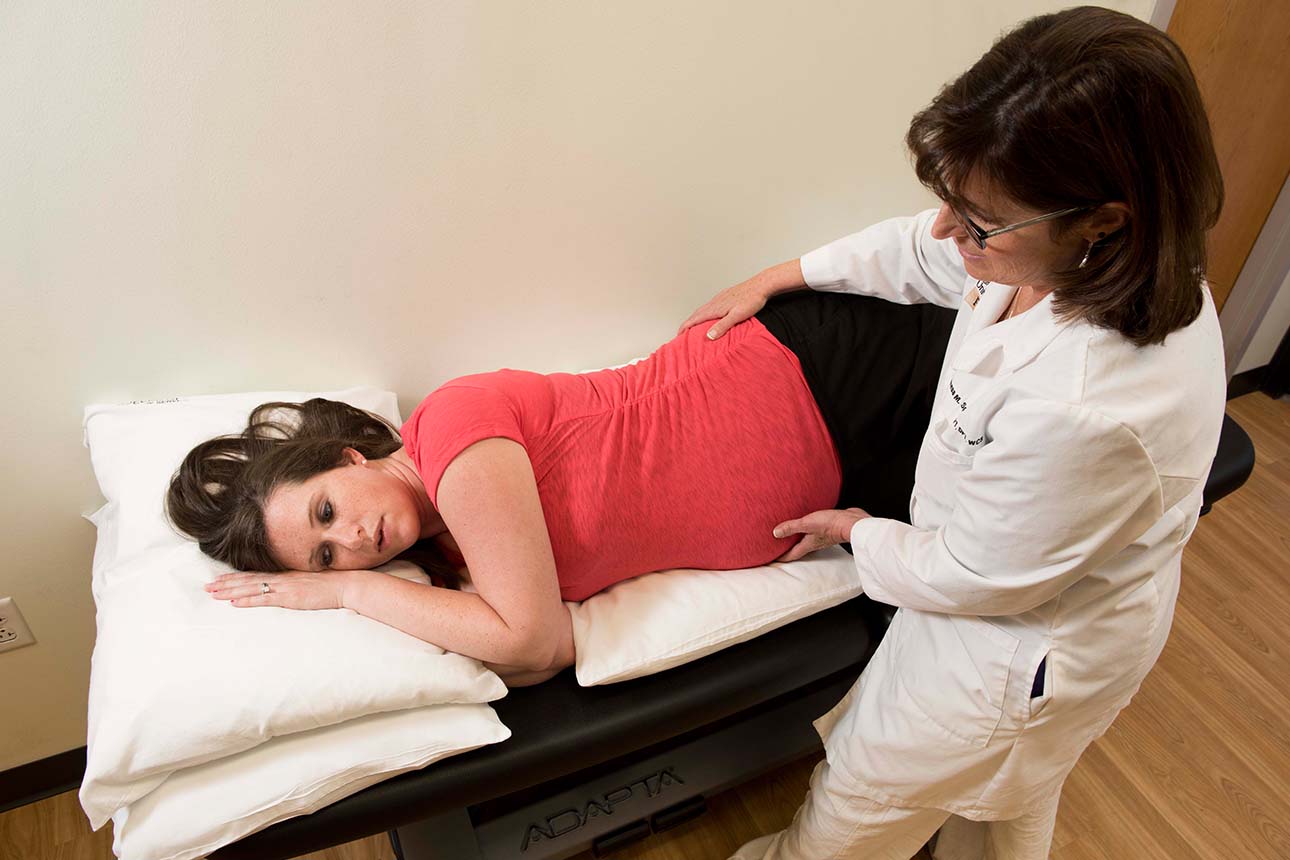Our Residency in Women’s Health provides an outstanding education to physical therapists interested in focused study of the practice of women’s and pelvic health.

Overview
Residents in the program receive specialized training in treating individuals with conditions associated with gender specific conditions common in physical therapy practice. Training includes a broad span of topics covered in the Women’s Health Description of Specialty Practice including musculoskeletal conditions common in pregnancy and pelvic floor dysfunctions, lymphedema, and osteoporosis. The program is a one-year paid training experience. After completion, residents are eligible to sit for the women’s health specialty exam.
Mentors
Theresa Spitznagle, PT, DPT, WCS
Dr. Spitznagle is an active leader in the APTA Section of Women’s Health and served as the Chair of the Women’s Health Specialist Council for the American Board of Physical Therapy Specialties. Her clinical interests include outpatient orthopedics, pelvic pain, and urinary incontinence.
Jennifer Miller, PT, DPT, WCS, CLT
Dr. Miller is a board certified women’s health specialist and certified lymphedema therapist specializing in the direct care of men, women, and children with pelvic floor dysfunction, musculoskeletal conditions, and lymphatic disorders.
Stacy Tylka, PT, DPT, WCS, CLT-LANA
Dr. Tylka, a certified lymphedema therapist and board certified women’s health specialist, treats patients with musculoskeletal dysfunction, pelvic pain, incontinence, lymphedema, and oncologic conditions. She is active in the APTA Section of Women’s Health and the American Board of Physical Therapy Specialties and has held multiple leadership positions.
Carlee Hill, PT, DPT
Dr. Hill has completed all three levels of the APTA’s Pelvic Health curriculum. Her clinical interests include outpatient orthopedics, pelvic pain, urinary and fecal conditions.
Curriculum
Residents work primarily in physical therapy clinics at Washington University and complete additional work at other St. Louis outpatient clinics.
Training includes:
- 36 hours of clinical work for 50 weeks in the Washington University Faculty Practice and in other St. Louis outpatient clinics
- Weekly mentoring sessions with Washington University faculty
- Classroom learning via seminars, rounds, colloquia, coursework, and continuing education
- Independent study in focused areas
2023-2024 Financial Fact Sheet

Program Outcomes
- 100% Pass Rate for the WCS Exam
- 1st time Pass Rate for WCS Exam: 100%
- Women’s Health Residency Completion Rate: 94%
- 100% of past residents have been initially employed as a Women’s and Pelvic Health Provider
- 87% of past residents participate in local and/or national leadership positions
Past Residents Professional Contributions to Women’s and Pelvic Health Literature and Educational Knowledge:
- Emily Yakel: PT, DPT WCS https://www.medifind.com/conditions/undefined/1797/clinical-trial/389861216
- Julia Foster, PT, DPT WCS: community education courses:
- Gut feeling: Bowel health with a Pelvic PT, https://www.eventbrite.com/e/gut-feelings-bowel-health-with-a-pelvic-pt-tickets-789415883157?aff=oddtdtcreator
- Labor Prep with a Pelvic PT https://www.youtube.com/watch?v=8DsVSF6dN4U
- Mastering Menopause: Pelvic Health https://www.youtube.com/watch?v=8DsVSF6dN4Uc
- Mastering Menopause: Bone Health https://www.youtube.com/watch?v=LCk7bPNULKA&t=887s
- https://www.girlsgonestrong.com/blog/sexual-health/how-genital-body-image-impacts-our-sex-life/
- https://www.ncbi.nlm.nih.gov/pmc/articles/PMC6711374/pdf/nihms-1039931.pdf
- Turner LA, Tylka SL, Miller J. Physical Therapy Evaluation and Treatment of Facial Lymphedema: A Case Report. Poster presentation at APTA Combined Sections Meeting, February 2011.
- Diagnosis Dialog for Women’s Health Conditions: The Process and Proposed Pelvic Floor Muscle Diagnoses, Movement-Related Urinary Urgency: A Theoretical Framework and Retrospective, Cross-sectional Study Aging and the Pelvic Floor https://link.springer.com/article/10.1007/s13670-018-0238-0
- Movement-Related Urinary Urgency: A Theoretical Framework and Retrospective, Cross-sectional Study KR Wente, TM Spitznagle – Journal of Women’s Health Physical …, 2017 – ingentaconnect.com
- Physical Activity and Stress Incontinence in Women.” Current Bladder Dysfunction Reports, July 2019. Tiffany Priest
- Abdominal Core Surgery Rehabilitation Protocols.” Americas Hernia Society Quality Collaborative, July 2019. Tiffany Priest
- Educational Session: Acute Care Physical Therapy After C-Section (6/11/21- 4 hours)
- Movement Impairments in Women with With and Without Urinary Urgency/Frequency
- Caldwell, Lauren MD; Halder, Gabriela E. MD, MPH; Dunivan, Gena MD; White, Amanda B. MD; Ossai, Uchenna DPT; Rogers, Rebecca G. MD. Women’s Experience of Their First Sexual Encounter After Pelvic Reconstructive Surgery. Obstetrics & Gynecology: September 2021 – Volume 138 – Issue 3 – p 353-360 doi: 10.1097/AOG.0000000000004486
- Dr. Uchenna”UC”Ossai she/her/hers
Sex ed platform designed, curated, & dope-certified for grown folk. AASECT certified sex counselor, pelvic PT, & professor
https://www.instagram.com/youseelogic/?hl=en - Zager, Jessica PT, DPT, WCS, CLT; Shelly, Beth PT, DPT, WCS, BCB-PMD; Miller, Jennifer DPT, CLT, WCS. Book Reviews. Journal of Women’s Health Physical Therapy: October/December 2019 – Volume 43 – Issue 4 – p 209-211doi: 10.1097/JWH.0000000000000151
- Olson, Amanda PT, DPT, PRPC; Zager, Jessica PT, DPT, WCS, CLT. Book Reviews. Journal of Women’s Health Physical Therapy: September/December 2018 – Volume 42 – Issue 3 – p 165-166doi: 10.1097/JWH.0000000000000110
- Karla Wente PT, DPT, WCS
PhysioSage Website – https://www.physiosage.org/
PhysioSage Instagram – https://www.instagram.com/physiosage/ - Stephenson, Rebecca PT, DPT, MS, WCS; Miller, Jennifer PT, DPT, CLT, WCS. Book Reviews. Journal of Women’s Health Physical Therapy: January/March 2022 – Volume 46 – Issue 1 – p 57-58 doi: 10.1097/JWH.0000000000000237
- Cabelka, Christine A. PT, MPT, PhD; Wisinski, Cheryl PT, DPT, WCS; Miller, Jennifer PT, DPT, CLT, WCS. Book Reviews. Journal of Women’s Health Physical Therapy: April/June 2019 – Volume 43 – Issue 2 – p 109-110 doi: 10.1097/JWH.0000000000000136
- Hohman, Rachel PT, DPT, CLT; Bartley, Whitney PT, DPT. Book Reviews. Journal of Women’s Health Physical Therapy: October/December 2021 – Volume 45 – Issue 4 – p 209-210 doi: 10.1097/JWH.0000000000000220
- Miller, Jennifer PT, DPT, CLT, WCS; Lee, Christina Machaby PT, DPT; Hohman, Rachel PT, DPT, CLT. Book Reviews. Journal of Women’s Health Physical Therapy: October/December 2020 – Volume 44 – Issue 4 – p 193-195 doi: 10.1097/JWH.0000000000000182
- Wente, K., Dolan, C. Aging and the Pelvic Floor. Curr Geri Rep 7, 49–58 (2018). https://doi.org/10.1007/s13670-018-0238-0